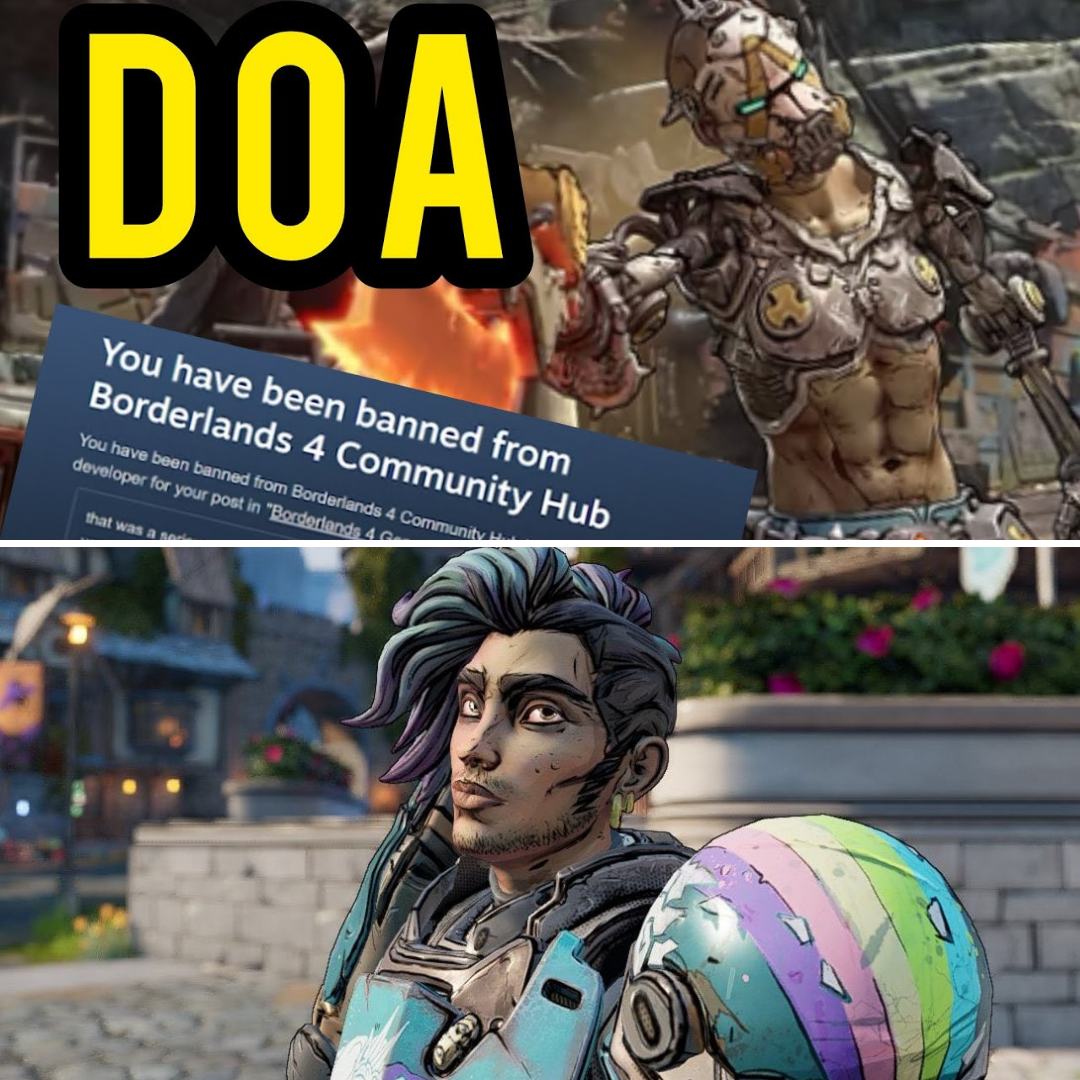Borderlands 4 Ban Controversy: Gendered Language Questions Spark Outrage
The gaming world is ablaze with controversy as Borderlands 4, the latest installment in Gearbox Software’s popular looter-shooter series, faces intense backlash over its community management policies. Reports surfaced in June 2025 that Gearbox is banning players from the Borderlands 4 Steam Community Hub for questioning the use of “gendered language” in the game’s localization, particularly in its German translation. This move, described by some fans as a “woke overreach,” has ignited a firestorm on platforms like X, with players accusing Gearbox of censoring free speech and alienating its core audience. As Borderlands 4 gears up for its 2025 release, the controversy raises critical questions about gaming culture, corporate moderation, and the balance between inclusivity and fan engagement. What’s driving these bans, and what do they mean for the future of the franchise? Let’s explore the incident, its roots, and its broader implications.

The Incident: Bans for Questioning Gendered Language
The controversy erupted on June 10, 2025, when a German gamer, identified only as a dedicated Borderlands fan, shared their experience on social media. According to posts on X, the player posted a question on the Borderlands 4 Steam Community Hub, asking whether the game’s German translation would use “gendered language” similar to Tiny Tina’s Wonderlands (2022). In German, nouns like “Bäcker” (baker) have masculine, feminine, and generic forms, and recent games have adopted gender-neutral or inclusive terms to align with modern linguistic trends. The question, described as “innocent” and “straightforward,” sought clarity on whether Borderlands 4 would follow suit, given the series’ history of irreverent humor and minimal focus on such issues.
Instead of receiving an answer, the player’s post was flagged as “spam” by moderators, and after reposting the question due to lack of response, they received a permanent ban from the Steam Community Hub. The gamer’s attempts to appeal through 2K Support, Gearbox’s publisher, were met with what X users called “robotic” and “careless” replies, stating that Steam forum decisions were final. Screenshots shared by the player showed moderators labeling the inquiry as “offensive,” though no explanation was provided. This incident, first highlighted by X user @SmashJT and amplified by YouTube channels like Doctor Disaster, quickly went viral, with fans decrying Gearbox’s heavy-handed moderation as an attempt to silence legitimate discussion.
The backlash intensified as other players reported similar experiences, with bans issued for posts questioning Borderlands 4’s approach to inclusivity. X posts from @LacroixDom39905 lamented, “I was genuinely excited for that game, but Gearbox drank the woke Kool-Aid,” while @DSeanMiller2 linked the bans to broader concerns about “rainbow crap” in the game. These sentiments, echoed across platforms, frame the bans as part of a larger trend of gaming companies prioritizing ideological agendas over fan engagement, drawing comparisons to past controversies like Borderlands 3’s pronoun policies.
The Context: Borderlands and Gender in Gaming
To understand the uproar, it’s worth examining the Borderlands series’ history and its evolving approach to gender and inclusivity. Launched in 2009, Borderlands is known for its anarchic humor, vibrant art style, and “bazillions” of guns, set in the post-apocalyptic world of Pandora. The franchise has historically leaned into edgy, irreverent storytelling, with characters like Claptrap, a foul-mouthed robot, and Tiny Tina, a chaotic teen explosives expert. Early games, like Borderlands 2 (2012), included subtle nods to diversity, such as gay and lesbian relationships, but these were woven into the narrative without heavy emphasis, earning praise for organic inclusivity.
However, Borderlands 3 (2019) marked a shift, introducing FL4K, a non-binary robot character who uses they/them pronouns. Gearbox announced that intentional misgendering of FL4K on its forums would result in bans, citing respect for the character’s non-binary creator. While accidental misgendering was excused, the policy sparked debate, with some fans on Reddit’s r/KotakuInAction calling it “ham-fisted identity politics” and others, like X user @rahimgotlost, praising Gearbox’s “inclusive thinking.” The controversy, covered by outlets like Daily Dot and Gamepressure, highlighted a growing tension: fans who valued Borderlands’ escapist chaos felt the series was becoming a platform for social messaging.
Tiny Tina’s Wonderlands, a 2022 spin-off, further fueled concerns about “gendered language.” In its German localization, the game used gender-neutral terms like “Bäcker*in” (baker) to avoid masculine or feminine forms, aligning with Germany’s push for inclusive language. This choice, while subtle, drew attention from players accustomed to standard German translations, prompting questions about whether Borderlands 4 would double down on such practices. Gearbox’s decision to ban inquiries about this topic, rather than clarify, has escalated the issue, with fans on X accusing the studio of avoiding transparency to push a “woke” agenda.
The Backlash: Fans Cry Censorship
The bans have triggered a fierce backlash, with fans and commentators framing Gearbox’s actions as authoritarian and out of touch. On X, users like @TC_squirrel1 shared YouTube videos decrying the bans, while @YellowFlashGuy called Gearbox’s moderation a “silencing tactic” that stifles free speech. The term “woke,” frequently invoked, reflects frustration with what some see as excessive sensitivity to social issues in gaming. Posts on Reddit’s r/gaming, like u/GamerRant’s, argue that banning questions about localization—a technical aspect of game design—alienates fans who simply seek clarity, not conflict.
Critics point to several issues:
Censorship Over Dialogue: The bans are seen as punishing curiosity rather than hate speech. The German gamer’s question, as reported by SmashJT, was neutral, asking about translation choices, not attacking inclusivity. Fans argue that Gearbox’s refusal to engage, followed by bans, signals intolerance for dissent, undermining the series’ rebellious spirit.
Alienation of Core Fans: Borderlands’ fanbase, historically drawn to its irreverent humor, feels betrayed by Gearbox’s shift toward strict moderation. X posts like @deenie7940’s claim the studio is “pandering to a vocal minority,” risking the loyalty of players who supported the series through its less polished early days.
Precedent from Borderlands 3: The FL4K controversy set a precedent, with Gearbox’s 2019 ban policy criticized as overzealous. Fans on NeoGAF, like user “GamerX,” called it “wack” for punishing pronoun misuse, and the Borderlands 4 bans are seen as an escalation, applying similar logic to broader questions about language.
Commercial Risks: With Borderlands 3’s mixed reception—praised for gameplay but criticized for writing—and the 2024 Borderlands movie’s $115 million box office flop against a $120 million budget, fans worry Gearbox is misjudging its audience. X user @jdontom predicted Borderlands 4 could “tank” if the bans deter players.
Supporters of Gearbox, though fewer, argue the bans protect the community from toxic behavior. On Reddit’s r/transgamers, users like u/PandaBoy praised Borderlands 3’s pronoun policy as a step toward normalizing non-binary identities, suggesting Borderlands 4’s moderation ensures a safe space for diverse players. However, even some defenders question the bans’ scope, with X user @ediblplaydough noting that banning questions about localization feels “excessive” compared to addressing direct harassment.
The Broader Context: Gaming Culture Wars
The Borderlands 4 controversy is a microcosm of gaming’s ongoing culture wars, where inclusivity efforts clash with demands for creative freedom. The industry has increasingly embraced diversity, with games like The Last of Us Part II (2020) and Cyberpunk 2077 (2020) featuring LGBTQ+ characters and gender options. These moves have won acclaim—The Last of Us Part II sold 10 million copies—but also sparked backlash, with some fans on X decrying “forced” representation. Gearbox’s actions align with this trend, reflecting a broader push to make gaming spaces more inclusive, particularly for marginalized groups.
However, the approach has risks. The 2014 Gamergate movement, which targeted developers and journalists over perceived “SJW” influence, showed how vocal minorities can amplify controversies. While Gamergate’s impact has waned, its echoes persist in debates over Borderlands 4, with X posts invoking terms like “SJW” and “virtue signaling.” Gearbox’s bans, intended to curb toxicity, may inadvertently fuel this narrative, framing the studio as antagonistic to its base. The Borderlands 3 FL4K bans, covered by KnowTechie, were criticized for inflating a “benign” policy into a PR crisis, and Borderlands 4 risks a similar Hydra Effect, where moderation draws more trolls.
Localization adds another layer. German’s gendered grammar, with nouns like “Bäcker” (male baker) and “Bäckerin” (female baker), has sparked real-world debates about inclusivity. Terms like “Bäcker*in” or “Bäckende” aim to be neutral but face resistance from traditionalists, as noted in a 2023 DW article. Games, as global products, must navigate these cultural nuances, but Gearbox’s refusal to discuss its approach—banning questions instead—has turned a technical issue into a flashpoint. Fans on Steam forums, like those in 2014 discussing Borderlands: The Pre-Sequel’s censorship, have long resented perceived overreach, and Borderlands 4’s bans tap into this frustration.
Gearbox’s Response: Silence and Speculation
As of June 12, 2025, Gearbox and 2K have not publicly addressed the bans, a silence that fuels speculation. Industry leaks suggest the studio is aware of the backlash but views the banned posts as violations of Steam’s community guidelines, which prohibit “spam” and “offensive” content. The lack of transparency, however, has worsened the situation, with fans on X demanding clarity on what constitutes a bannable offense. Some speculate Gearbox is preemptively cracking down to avoid a repeat of Borderlands 3’s pronoun controversy, where FL4K’s they/them pronouns dominated pre-release discourse.
The bans’ timing, just months before Borderlands 4’s expected release, is precarious. The game, teased at The Game Awards 2024, promises a new planet, four new Vault Hunters, and enhanced loot mechanics, building on Borderlands 3’s 17 million sales. However, Gearbox’s recent struggles—the Borderlands movie’s failure and Tiny Tina’s Wonderlands’ mixed reception—heighten the stakes. Leaks from WDW Pro suggest the studio is under pressure from 2K to deliver a hit, and alienating fans could jeopardize pre-orders, especially after Borderlands 3’s Epic Games Store exclusivity sparked boycott threats.
The Cultural and Commercial Stakes
The Borderlands 4 bans reflect a broader tension in gaming: balancing inclusivity with fan expectations. The industry’s push for diversity, driven by a growing demographic of female and LGBTQ+ players (47% of U.S. gamers are women, per a 2024 ESA report), has reshaped community management. Companies like Blizzard and Riot Games have faced similar backlash for strict moderation, with Overwatch’s 2022 chat filters criticized as “tone policing.” Gearbox’s approach, while aiming to foster a welcoming space, risks misfiring by targeting questions rather than harassment, as seen in the German gamer’s case.
Commercially, the bans could hurt Borderlands 4’s prospects. The series thrives on its loyal fanbase, with Borderlands 2 still active on Steam a decade after release. However, fan goodwill is fragile, as seen with Cyberpunk 2077’s launch woes, which cost CD Projekt Red millions in refunds. If Borderlands 4’s bans deter players, Gearbox risks a repeat of Anthem (2019), where community distrust contributed to the game’s failure. Conversely, a successful launch, with polished gameplay and a lighter moderation touch, could quell the controversy, as Spider-Man: Miles Morales (2020) did despite initial diversity debates.
The bans also highlight the challenges of localization in global gaming. German players, accustomed to precise translations, expect clarity on linguistic choices, especially in a series known for witty dialogue. Gearbox’s refusal to engage, as reported by SmashJT, contrasts with studios like CD Projekt Red, which openly discuss localization for The Witcher series. By banning questions, Gearbox has turned a niche issue into a symbol of corporate overreach, amplifying distrust in an era where gamers value transparency.
What’s Next for Borderlands 4?
Gearbox faces a pivotal moment. To mitigate the backlash, the studio could issue a statement clarifying its moderation policies, as it did for Borderlands 3’s FL4K controversy, emphasizing that only intentional harassment, not genuine inquiries, warrants bans. A new trailer, showcasing Borderlands 4’s chaotic gameplay and humor, could shift focus to the series’ strengths, as Borderlands 3’s E3 2019 reveal did despite pronoun debates. Engaging with fans on platforms like Reddit, where r/Borderlands has 500,000 members, could also rebuild trust, though Gearbox must avoid dismissive or corporate responses.
For players, the controversy underscores the power of collective action. Boycott threats on X, while often overstated, can influence studios, as seen with Star Wars Battlefront II’s (2017) loot box reversal. Fans demanding answers about Borderlands 4’s localization or moderation may push Gearbox to reconsider its approach, especially if pre-order numbers dip. However, the vocal minority driving the backlash—amplified by YouTube channels like Doctor Disaster—may not represent the broader audience, with many players likely unaware of the bans.
The controversy’s long-term impact depends on Borderlands 4’s quality. A stellar game, like Elden Ring (2022), can overcome pre-release drama, while a flawed one, like Anthem, risks collapse. Gearbox’s history of delivering addictive gameplay gives hope, but the bans have dented its rebel image, with fans on X lamenting a shift from “badass” to “bureaucratic.” The studio’s next moves—whether doubling down or dialing back—will shape the narrative.
Conclusion: A Game Caught in the Crossfire
The Borderlands 4 ban controversy, sparked by a simple question about gendered language, has exposed the fault lines in gaming’s cultural landscape. Gearbox’s decision to censor rather than clarify has turned a niche inquiry into a rallying cry for fans frustrated by perceived “woke” overreach. Yet, the bans also reflect the industry’s struggle to create inclusive spaces without alienating its base, a challenge intensified by the global nuances of localization.
As Borderlands 4 approaches, Gearbox must navigate this minefield to preserve the series’ anarchic spirit. For fans, the debate is a reminder of their influence—and the stakes of voicing concerns in an era of heightened moderation. Will Borderlands 4 rise above the controversy to deliver the loot-filled chaos fans crave, or will it succumb to the weight of its own policies? The answer lies in Pandora’s next chapter, where guns, humor, and now pronouns battle for supremacy.





